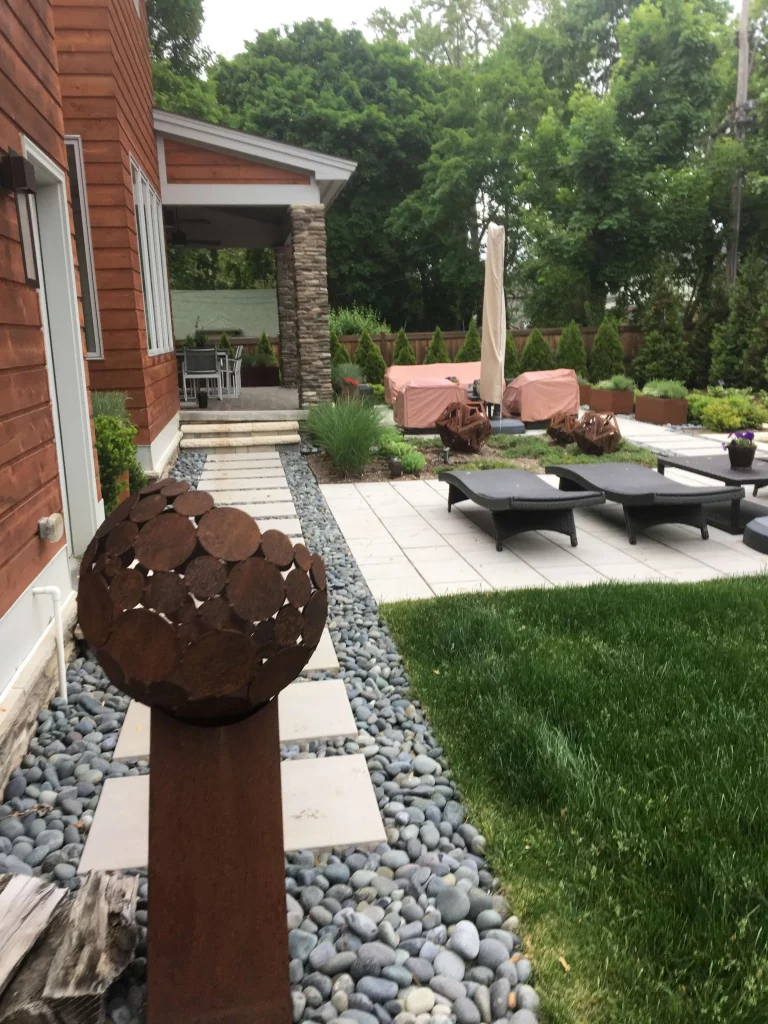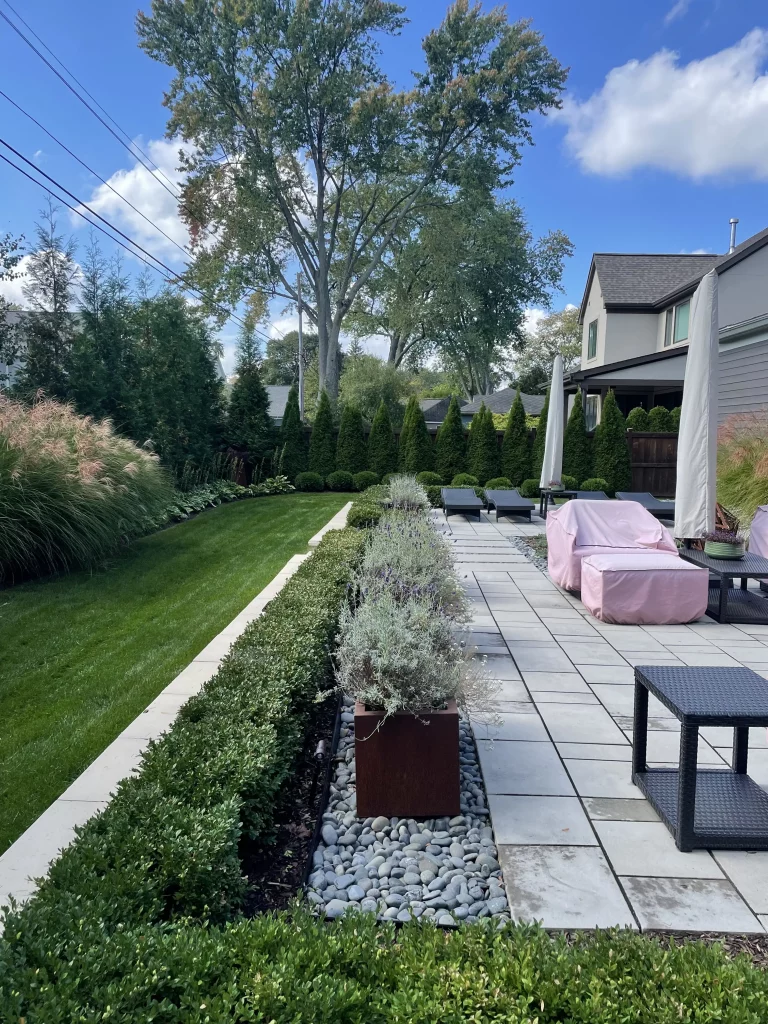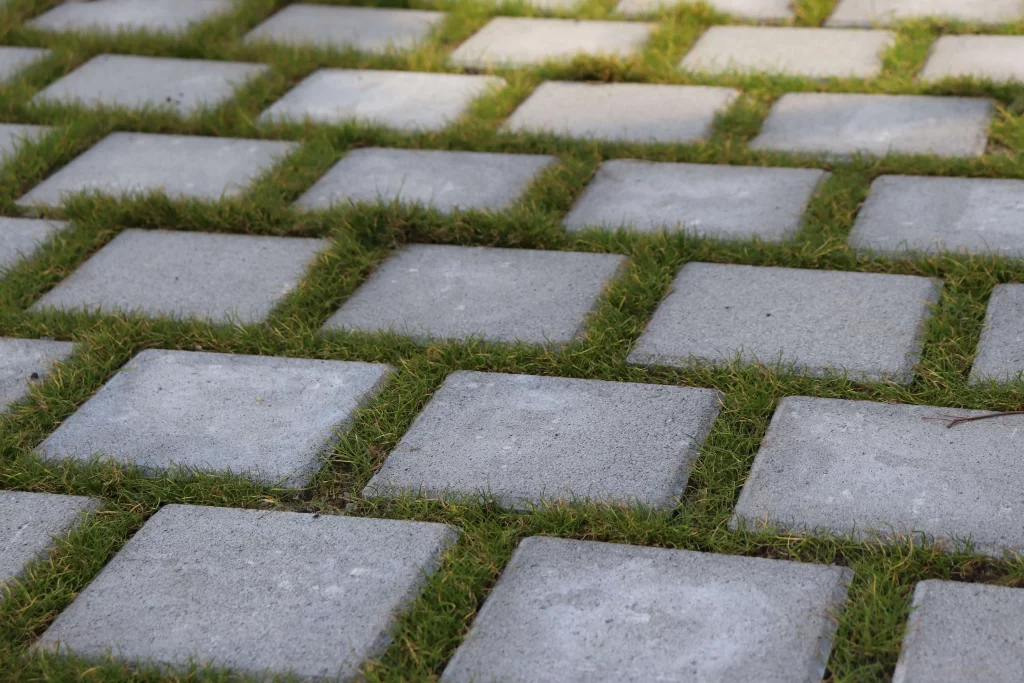If you’re looking to add a beautiful and functional outdoor living space to your home, a paver patio is an excellent choice. It offers a wide range of design options, but pavers are also durable and easy to maintain. In this article, we’ll explore the best way to build a paver patio and why they’re better than stamped concrete and concrete patios.
Steps to build a Paver Patio
Preparing the Site
The first step in building a paver patio is preparing the site. This involves removing any grass or vegetation and excavating the soil to a depth of at least 6 – 8 inches. This will provide a solid foundation for the patio and prevent it from shifting or settling over time. Once the site has been excavated, a layer of gravel or crushed stone should be spread and compacted to further stabilize the ground.
Installing the Base
The next step in building a paver patio is installing the base. This involves laying down a layer of sand or stone dust over the gravel or crushed stone. The base should be at least 1 inch thick. It should be leveled and compacted using a plate compactor or hand tamper. The base is important because it provides a smooth and stable surface for the pavers to rest on. It also helps prevent them from shifting or settling.
Laying the Pavers
Once the base has been installed, it’s time to lay the pavers. Pavers come in a variety of shapes, sizes, and colors, so it’s important to choose the ones that best fit your design vision. Pavers should be laid in a pattern that complements the shape of the patio and allows for proper drainage. The joints between the pavers should be filled with sand to help lock them in place and prevent weed growth.
7 Benefits of Paver Patios in Michigan over Stamped Concrete and Concrete Patios.



In Michigan, pavers can be a better choice than concrete for a number of reasons. One of the main considerations for any outdoor living space in Michigan is the climate, which can be harsh and unpredictable. Pavers offer a number of advantages over concrete when it comes to durability and performance in this type of environment.
1. Durability
Paver patios are also extremely durable. Pavers are made from high-quality materials that can withstand heavy foot traffic, harsh weather conditions, and regular use. They’re also resistant to cracking and chipping, which can be a common problem with concrete patios.
2. Environmentally Friendly
Paver patios are also environmentally friendly. Because they’re made from natural materials, they don’t contribute to the pollution and environmental damage associated with concrete production. Additionally, the gaps between the pavers allow rainwater to seep into the ground, replenishing the water table and supporting local ecosystems.
3. Freeze-Thaw Resistance
Michigan experiences freezing and thawing cycles throughout the year, which can cause damage to outdoor living spaces like patios. Pavers are generally more resistant to damage from these cycles than concrete. This is because concrete is more prone to cracking and chipping when exposed to extreme temperature changes, whereas pavers are more flexible and able to withstand these conditions.
4. Natural Drainage
Another advantage of pavers in Michigan is their ability to provide natural drainage. Pavers are installed with gaps between them, allowing rainwater to seep into the ground and prevent pooling or flooding. This is particularly important in Michigan, where heavy rainfall and snowmelt can cause problems for outdoor living spaces.
5. Design Flexibility
Pavers also offer greater design flexibility than concrete. Pavers offer a wide variety for homeowners in Michigan. They come in different shapes, sizes, and colors. So, homeowners can create a personalized outdoor living space. Moreover, pavers allow homeowners to add unique touches to their patios, walkways, and driveways. Whether someone prefers a modern or traditional look, they can find pavers that fit their style. Pavers can be arranged in intricate patterns, mixed with other materials like natural stone or brick, and used to create borders or accent areas on the patio.
6. Easy Maintenance
Maintaining a paver patio is also relatively easy in Michigan. Because pavers are individual units, any damaged or stained pavers can be easily replaced without affecting the rest of the patio. This makes it easy to keep the patio looking clean and fresh year-round. It is particularly important in a climate that can be tough on outdoor living spaces.
7. Improved Property Value
Finally, a well-designed and professionally installed paver patio can significantly improve property value in Michigan. A beautiful outdoor living space is a sought-after feature for many homebuyers, and a paver patio can help set a home apart from others on the market.
Overall, pavers can be a better choice than concrete for outdoor living spaces specifically in Michigan. The climate in Michigan can be tough on outdoor living spaces, and pavers offer a number of advantages when it comes to durability, maintenance, and design flexibility. With proper installation and maintenance, a paver patio can provide many years of enjoyment and add value to a home in Michigan.
Final Verdict
In conclusion, Opting for a paver patio in Michigan is a best choice when aiming to incorporate an attractive outdoor living area into your home. In this article, we have learned how to build a paver patio and How it is a better option than stamped concrete and concrete patios. This process involves preparing the site, installing the base, and laying the pavers in a pattern that complements the shape of the patio and allows for proper drainage. Paver patios offer greater design flexibility, durability, easy maintenance, natural drainage, and are environment friendly. Consequently, pavers are more resistant to freeze-thaw cycles, provide natural drainage as it offer greater design flexibility, and are easy to maintain.
A pavers are stones made up of concrete, natural stone, clay brick or even porcelain. Typically, they are small pieces and available in different sizes. Homeowners have a choice of various colors, textures, and patterns.
Pavers are a great long-term investment due to their durability, curb appeal, and lower repair costs. They come in various styles and colors to match your home’s exterior. While concrete can be costly to repair and it can be challenging. Consider both upfront cost and long-term maintenance before choosing between concrete and pavers.


